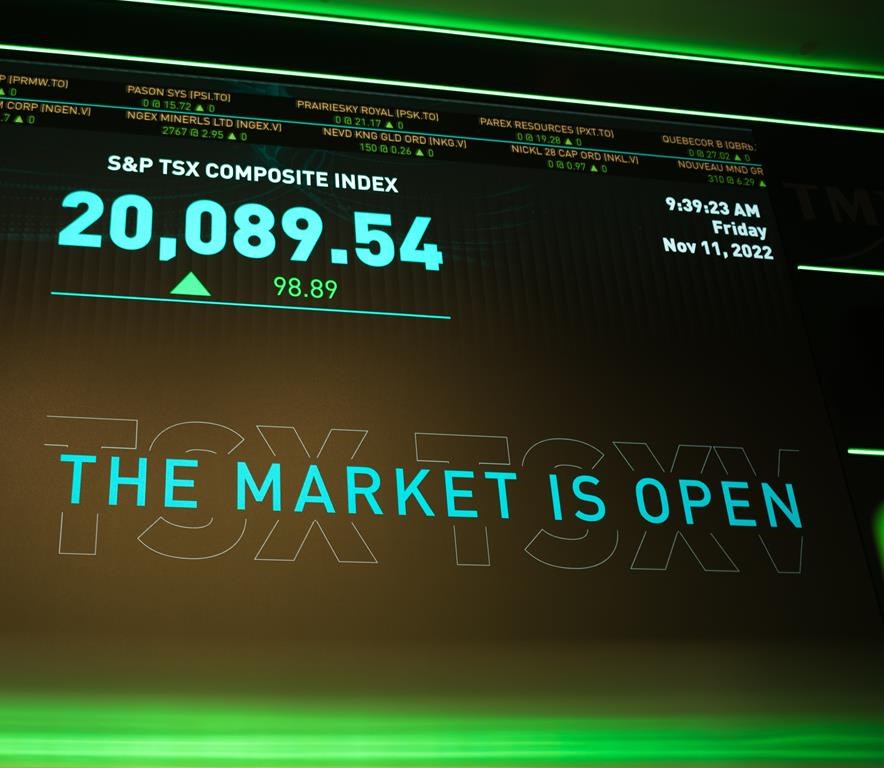Canada’s main stock index gained almost 300 points on a broad-based rally led by base metal stocks as the price of oil reached US$90 per barrel, while U.S. stock markets also rose.

A strong initial public offering (IPO) by a semiconductor company helped lift investors’ spirits Thursday and offset several economic reports that came in stronger than expected, said Michael Currie, senior investment adviser at TD Wealth.
Shares in U.K. firm Arm Holdings opened at US$56.10 on the Nasdaq after being priced at $51. At the end of the trading day, its stock was up almost 25 per cent at $63.59.
The S&P/TSX composite index closed up 288.90 points at 20,567.84.
In New York, the Dow Jones industrial average was up 331.58 points at 34,907.11. The S&P 500 index was up 37.66 points at 4,505.10, while the Nasdaq composite was up 112.47 points at 13,926.05.
Arm’s debut was one of the biggest IPOs in a while, and markets appear to be sighing with relief after a strong showing for what some saw as a “bellwether” deal, said Currie.

Get breaking National news
“If it had stumbled out of the gate, that might have been pretty negative,” he said.
“It shows people are willing to put new money into something new, and that is, I think, sort of driving up the market overall.”
Arm’s successful IPO also helped markets shake off a set of economic reports that were somewhat stronger than investors would like to see amid ongoing tightening by central banks, said Currie.
U.S. shoppers spent more at retailers last month than expected, while wholesale prices rose more than expected by economists. As well, fewer workers applied for unemployment benefits last week than anctipated.
Despite what stronger economic data could imply for interest rates, “The market’s kind of shrugging it off,” said Currie.
And on the other side of the pond, the European Central Bank raised interest rates again, but also seemed to hint that it’s now on hold.
“The theme is that inflation is certainly not coming down,” said Currie, or at least not at a pace market watchers would like to see.
“Rates at best are flat, like we saw in Canada, or going up as we saw in Europe. And there’s zero talk about them going down.”
After a slow and steady climb, the price of oil tipped past US$90 per barrel Thursday. Though demand isn’t necessarily booming, production cuts have been helping to keep supply tight, said Currie.
Oil plays an important role in inflation, noted Currie. In its latest rate decision, the Bank of Canada said it expects rising oil prices will keep inflation higher in the short term.
Some notable upward movers on the TSX Thursday included Empire Co. Ltd. and Transat A.T., said Currie, both of which reported strong earnings. Meanwhile, shares in Laurentian Bank were more than 12 per cent lower after it said it concluded a review of its strategic options without a deal to sell.
The Canadian dollar traded for 73.99 cents US compared with 73.80 cents US on Wednesday.
The October crude contract was up US$1.64 at US$90.16 per barrel. The October natural gas contract was up three cents at US$2.71 per mmBTU.
The December gold contract was up 30 cents at US$1,932.80 an ounce and the December copper contract was up three cents at US$3.82 a pound.
— With files from The Associated Press







Comments
Want to discuss? Please read our Commenting Policy first.